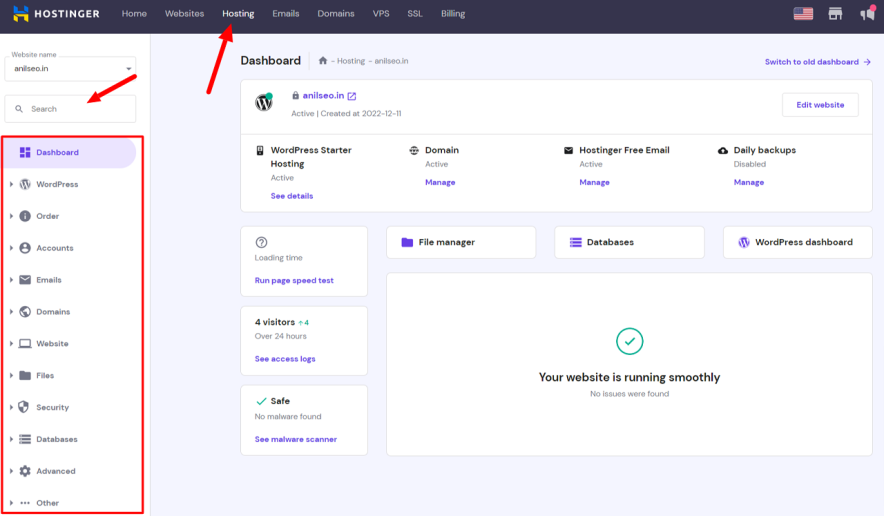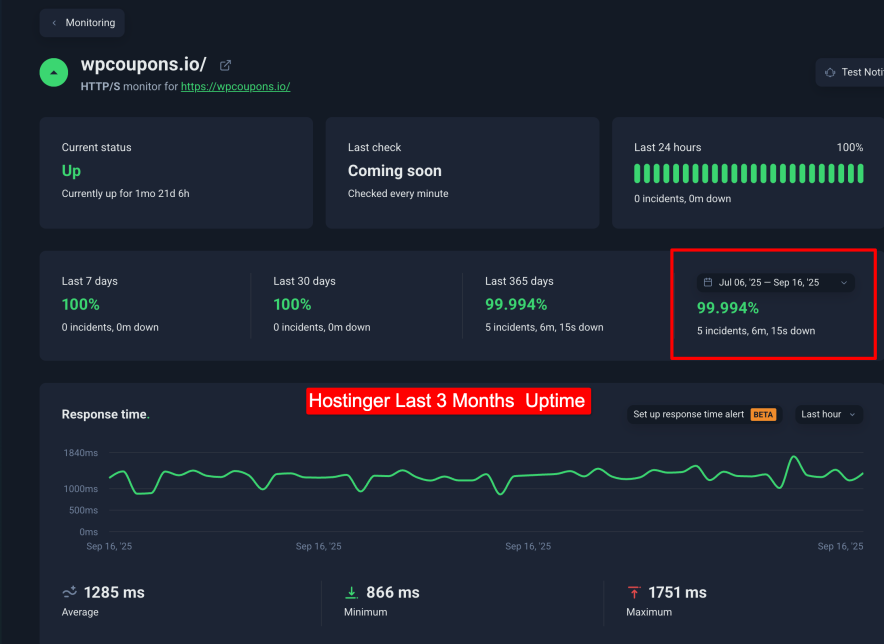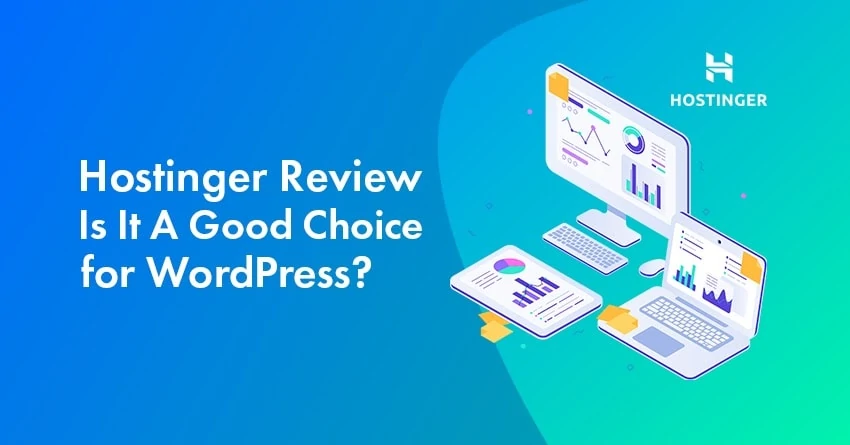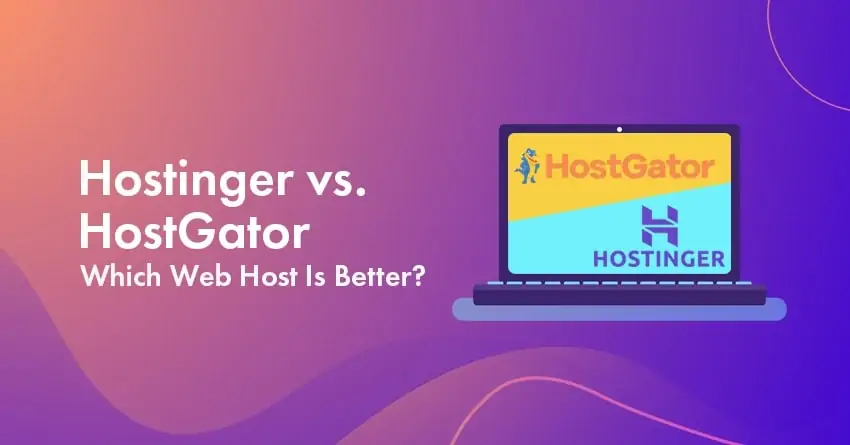
Product Name: Hostinger or Bluehost
Summary
Hostinger is the ideal web hosting choice for beginners looking for a user-friendly and fast loading server, starting at just $2.65/month (with ANILAGARWAL promo code). Bluehost is an excellent choice for those who want web hosting for a up to 100 sites with decent uptime and phone support. The plans start at only $3.79/month (Recommend Choice Plus Plan).
If you’re looking for web hosting, you’ve probably come across Bluehost and Hostinger—two of the most popular hosting providers in the industry.
The tricky part? Their pricing is almost the same, but their features vary slightly. And when it comes to performance, security, and customer support, figuring out which one is better isn’t easy.
Another big issue?
Most reviews on the internet are biased because both Bluehost and Hostinger have some of the most lucrative affiliate programs. As a result, people often praise them without revealing any hidden drawbacks.
Now, I won’t deny that I’m also part of their affiliate programs. But the difference is, that I promote only what’s actually valuable for users. To make this comparison genuine and unbiased, I personally purchased hosting plans from both providers and set up test websites.


In this article, I’ll cover pricing, features, performance, security, customer support, and more to help you decide which hosting provider is the right fit for your website.
Enough talking. Let’s head to the comparison.

Table of Contents
Hostinger vs Bluehost – Summary
After digging into Bluehost and Hostinger, it’s clear that both have their own strengths, depending on what you need for your site hosting server.
If you’re after affordable, high-performance hosting, Hostinger is the obvious choice. During my tests, Hostinger outperformed Bluehost in speed, uptime, and pricing transparency.
Their 99.9% uptime guarantee held up, and my test sites loaded noticeably faster compared to Bluehost.
Another thing I liked? Hostinger gives you more for less. Even their cheapest plan ($2.99/month) includes 25 GB SSD storage, support for 25 websites, AI website builder, and Unlimited free migrations.
Plus they have data centers around 10 global locations which gives you better reach, which is something Bluehost lacks as it only offers 2 data centers (USA & India)
The custom control panel is another win. It’s sleek, modern, and easy to navigate, and Hostinger’s AI-powered tools make setting up and managing your site even easier.
The only downside? Live chat support can be slow, but once you get connected, the agents are super knowledgeable and helpful.
If budget, speed, and security are your top priorities, Hostinger is hands-down the better option.
If you’re planning to run an eCommerce store with WooCommerce, Bluehost makes the setup ridiculously easy with its built-in WooCommerce integration.
Another advantage? Phone support. While Hostinger only offers live chat, Bluehost gives you 24/7 phone support, which can be a lifesaver if you prefer talking to someone directly rather than waiting in a chat queue.
That said, Bluehost isn’t as transparent with pricing. Their cheapest plan starts at $3.79/month, and it renews at a much higher rate
In short, if speed, storage, and overall value matter more, Hostinger still comes out on top. But if quick & easy eCommerce store setup + phone support is your requirement you can consider Bluehost.
Please review your needs carefully and make a wise decision.
| Hostinger Pros | Hostinger Cons |
| Lower entry price ($2.99/month) | Phone Support is absent. |
| Free weekly website backups with all plans (free daily backups with higher plans). | Live chat wait times can be long. |
| More storage and website allowance are available on lower-tier plans. | |
| Unlimited free website migrations. | |
| AI-powered tools for ease of use. | |
| More affordable & transparent pricing. | |
| Faster performance with a 99.9% uptime guarantee. | |
| Advanced security with Cloudflare protection. |
| Bluehost Pros | Bluehost Cons |
| Easy WooCommerce setup for eCommerce | Bluehost is known for lots of upsells, and it doesn’t offer free backups on starter plans (unlike Hostinger) |
| 24/7 phone and chat support | Expensive entry level plans |
| Limited storage & website allowance on cheaper plans | |
| No uptime guarantee and inconsistent performance | |
| Higher renewal prices & fewer billing cycle options |
Please keep in mind that Hostinger and Bluehost are entry level hosts and that’s why they offer an average level of performance. If you have a budget and you don’t want to compromise on the speed and reliability of a server, you should consider top level hosts. Few names in this category are WPX hosting (My site BloggersPassion is hosted here), and Cloudways (Affordable but top tier performance).
Quick Note: Recently, Bluehost increased the pricing from $1.99/mo to $3.67/mo. The changes in pricing seem totally irrelevant.
Hostinger vs Bluehost: Comparing Main Modules Side by Side
Hosting Features Comparison:
| Features | Hostinger | Bluehost |
| Websites Allowed | 25-100 | 10-100 |
| Storage | 25-100 GB NVMe | 10-100 GB NVMe |
| Uptime Guarantee | 99.9% | NA |
| Data Centers | Netherlands, Germany, France, Lithuania, United Kingdom, Singapore, India, Indonesia, USA & Brazil | USA & India |
| Bandwidth | Unmetered | Unmetered |
| Website Builder | AI Based | Basic builder only |
| Migration | Free | Only if you are eligible |
| 50-200 Accounts | 30 days trial then paid | |
| SSL | Free | Free |
| Free Backups | Weekly (Basic), Daily (Higher Plans) | Not in all plans |
| cPanel | Available | Available |
| Free Domain Privacy | Available | Available (Not in all plans) |
| Security | Cloudflare security suite | Basic spam protection (SiteLock paid) |
| Performance | Fast & Stable | Inconsistent |
| Support | 24/7 chat, strong knowledge base | 24/7 chat & phone support |
| Staging Site | Available | Available |
| Store Features | Starts from Business plan | Starts from Online store plan |
| Starting Pricing | $2.99 – $7.99/month | $3.79 – $9.79/month |
| Best For | Budget users, performance seekers, developers | WordPress users, business sites, WooCommerce |
Takeaway on features of both the hosting providers:
1.) Hostinger gives you more SSD storage even on the cheapest plans. If your website has a lot of media files, this is a huge plus. Bluehost’s lower-tier plans feel a bit restrictive in comparison.
2.) Backups are included for free on most Hostinger plans, whereas Bluehost charges extra unless you upgrade to a more expensive tier.
3.) Security-wise, both providers offer a free SSL certificate, but Hostinger includes Cloudflare protection, which is a nice bonus for security-conscious users.
4.) Email hosting was a big letdown for me with Bluehost. They only give you one free Microsoft 365 email account, and it’s just a 30-day trial. After that, you have to pay extra for every email address. Hostinger, on the other hand, gives you up to 200 free email accounts on most plans.
5.) Bluehost includes Weebly for free, but I found it very basic. Hostinger has an AI builder, which offers a more flexible drag-and-drop builder.
6.) How can we forget that Hostinger offers 10 data centers across the globe, where Bluehost just has 2 server locations (India & USA).
7.) Hostinger also offers in-built Email Marketing tool named Hostinger Reach. Bluehost doesn’t have a similar tool. Also, Hostinger has a Horizons tool used for building an AI App tool without any coding skills.
User Interface of Both Hosting:
Winner: Hostinger

Hostinger uses hPanel, while Bluehost uses cPanel as their backend dashboard control panel.
Regarding ease of use, Hostinger takes the lead because of its user-friendly hPanel. See how to install WordPress on Hostinger for more details.
On the other hand, Bluehost’s cPanel is an industry-standard system in the hosting space, so the benefit is you’ll find lots of tutorials related to it whenever you’re stuck at something. It has been in the industry for over 20 years.
The hPanel of Hostinger is relatively new and only available with Hostinger. The basic working principle, features, and appearance of both cPanel and hPanel are 95% similar. So either way, it’s easy to use.
With that said, from our experience of using both hostings, we found Hostinger to be more user-friendly. The main features, like domains, emails, backups, etc., were easily accessible from the dashboard. It has a clean and modern design focused on simplicity.
It was easy to navigate through Hostinger’s hPanel and find specific options. It gives that modern design and feel.
Bluehost’s cPanel was also good, but you will find it more helpful if you’re already experienced using cPanel-based hosting providers.
Performance Testing (Speed, Uptime & More)
Winner: Hostinger
Uptime:
Hosting uptime is one of the KEY metrics.
In simple words, uptime is the amount of time a website hosting service can keep a website or server up and running without downtime or interruptions.
So what’s the uptime of Bluehost and Hostinger? Let’s find out.
Here’s the uptime of Hostinger:

As you can see above, Hostinger’s uptime is excellent at 99.994% in the last 3 months time frame, and the average response time is just 866 milliseconds!
Here’s the uptime of Bluehost:

As you can see above, Bluehost’s uptime is slightly lower than Hostinger’s uptime at 99.955% in the last 30 days, and response time is MORE compared to Hostinger, which is 878 milliseconds!
So, when it comes to uptime and server response time, Hostinger is slightly better than Bluehost.
Speed:

Hostinger outranks Bluehost in speed. Our test of Hostinger servers (premium shared hosting plan) found that the average website loading time was only 1.78 seconds.
On the other hand, when we tested Bluehost servers, the website loading time was 3 seconds. When it comes to website loading, every second counts.
So, even a 1-second difference can have a significant impact. A part of this result is that Hostinger uses more advanced infrastructure, unlike Bluehost.
Hostinger’s servers use LiteSpeed web server software, which efficiently utilizes resources and delivers faster performance than Apache servers used by Bluehost.
Server Response Time:
Server Response time or TTFB test is crucial because it clearly shows how quickly a Bluehost or Hostinger reacts to the request sent by the browser in real time.
Now traffic can come from any part of the world, So this is how quick Hostinger servers respond. The Hostinger average TTFB is 0.865 seconds which is considered quick & appropriate.

On the other hand, Bluehost is very close to Hostinger in terms of SRT metric. I recorded an average of 0.922s TTFB for Bluehost.

Overall, Hostinger is ahead in terms of performance. Bluehost gets close in uptime and server response time, but the page loading speed (3 sec compared to Hostinger average 1.78 sec) really disappoints me.
Backups & Security
Winner: Hostinger
Backups are REALLY important.
Why? If you lose data, including your website files, it’s impossible to get it without backups.
Hostinger offers free weekly backups with all the WordPress plans.
WordPress Business hosting packages also include FREE automated daily backups, so you will never lose your website data.
Regarding security, Hostinger offers a dedicated web application firewall, free SSL certificates, and anti-DDoS protection for all WordPress plans.
Bluehost offers free automated backups powered by CodeGuard (with Choice Plus and Pro plans).
You’ll have to purchase backups as an add-on with the Basic and Plus plans from Bluehost.
When it comes to security, Bluehost security features such as free SSL certificates, free domain privacy, and Malware Scanning (Sitelock Free) with all hosting plans.
Verdict: Regarding backups and security, Hostinger is better than Bluehost.
How’s the Customer Support of Hostinger and Bluehost?
Winner: Bluehost
When choosing a web hosting service, it’s essential to consider customer support.
So how good is the customer support of Hostinger vs Bluehost? Let’s find out.
Hostinger offers 24/7/365 live chat support. However, it doesn’t provide phone support.
Hostinger support is excellent as they almost always respond to your queries faster.
Hostinger also offers a knowledge base where you can find answers to most web hosting queries.

Bluehost offers 24/7 live chat, email, and phone support.
Compared to Hostinger, Bluehost provides phone support as well and you can reach out to them via phone at: 888-401-4678. Plus, one of the biggest advantages of Bluehost is they also offer support in regional languages, especially if you buy their hosting plans in India.
Bluehost offers extensive support resources that include FAQs and guides on web hosting, domains, etc.
In our testings, both Hostinger and Bluehost performed well. The only major difference was the speed and helpfulness of the responses we got. With Bluehost, as soon as we hopped on the live chat, a support staff connected with us and started answering our queries within a minute.
On the other hand, with Hostinger, we had to wait quite a few minutes to get a response from the support staff. However, they explained our questions in a helpful and detailed way.

Verdict: When it comes to customer support options, Bluehost responds faster than Hostinger Customer support. However, if you prefer getting helpful answers at the cost of waiting a few minutes or hours to get your technical issues sorted out easily, then Hostinger is the best option.
But overall, with phone support, faster response time and support in regional languages, Bluehost gets a slight edge over Hostinger.
Bluehost vs Hostinger: Pricing
Winner: Hostinger
| Points | Hostinger | Bluehost | Winner |
| Affordability | Plans start from $2.99/mo to $7.99/mo | Plans start from $3.79/mo to $14.79/mo | Hostinger |
| Tenure | 1 Month, 12 Months, 24 Months, 36 Months | 12 Months, 36 Months | Hostinger |
| Renewal Costs | Starts at $10.99/month (12 Months Tenure) | Starts at $11.99/month (12 Months Tenure) | Hostinger |
| Hidden Costs | X | Yes (associated to freebies limited period | Hostinger |
| Managed WordPress | Supported | Supported | Tie |
| Number of Websites | 25-100 | 10-100 | Hostinger |
| Support | Live Chat (24*7) | Live Chat & Phone Support | Bluehost |
| Store Features | Basic features via WooCommerce | Basic features via WooCommerce | Tie |
| Free Domain (1 Year) | Yes | Yes | Tie |
| Free CDN | Not in all plans | Available in all plans | Bluehost |
| Free SSL | Yes | Yes | Tie |
| Free Migration | Yes | Depends if you are eligible, Otherwise you might have to pay up to $145 extra amount | Hostinger |
| Domain Privacy | Free in all plans | Not Free in all plans | Hostinger |
| Free Backups | Free in all plans | Not Free in all plans | Hostinger |
| Storage | 25-100 GB NVMe | 10-100 GB NVMe | Hostinger |
| Bandwidth | Unmetered | Unmetered | Tie |
| Dedicated IP | Supported in high end plan | Supported in high end plan | Tie |
| Security | Same Level | Same Level | Tie |
| AI Website Builder | Available | Basic | Hostinger |
| Money Back Guarantee | 30 Days | 30 Days | Tie |
Our Experience with Pricing on Both Platforms:
Both Hostinger and Bluehost offer competitive pricing, but their approach differs. Hostinger pricing structure is transparent, with affordable plans and flexible billing cycles.
Bluehost, on the other hand, recently increased the pricing to $3.79 from $1.99. That’s a major disadvantage. And also, renewals can be significantly higher.
In our opinion, if you’re a beginner and looking for the best cheap WordPress hosting provider only for a single website that offers great customer support, features, and decent performance, go with Bluehost. That was our statement when Bluehost pricing was cheaper. Now I don’t find a single reason to go with Bluehost plans. That’s the verdict.
Hostinger provides better long-term value with more websites, storage, and transparent pricing. Hostinger’s flexible billing and included features make it the better choice for budget-conscious users.
Hostinger’s most value for money plan is its Premium plan ($2.99) where you also get free domain and email and 25 GB storage.
When discussing Bluehost most fair plan, it’s the Business. This plan offers 50 website installations, and 50 GB SSD storage, along with essential freebies like daily backups and domain privacy.
Note: Both Hostinger and Bluehost’s plans are able to handle 5K to 40 monthly traffic easily. But you will get slightly better speed and response time with Hostinger.
Similarities:
- Both providers offer shared hosting, WordPress hosting, WooCommerce hosting, VPS hosting, and cloud hosting.
- Both provide free SSL certificates and a free domain with certain plans.
- Unlimited bandwidth is included in all shared hosting plans.
Key Differences:
Hostinger: Affordable & Flexible
- Starts at $2.99/month for 25 websites, 25 GB SSD storage, and unlimited bandwidth.
- Offers more billing flexibility (monthly, yearly, biennial, or quadrennial).
- Transparent pricing with minimal hidden fees.
- Includes weekly backups for basic plans and daily backups for higher plans.
- More affordable higher-tier plans compared to Bluehost.
Bluehost: Competitive But Less Transparent
- Starts at $3.79/month but limited to 10 websites and 10GB NVMe storage.
- Offers only 12 and 36-month billing cycles.
- The renewal rates are higher compared to Hostinger.
- Some essential features require additional purchases (e.g., backups).
- Provides better managed WordPress hosting for users needing premium WordPress support.
FAQs:
Is Hostinger better than Bluehost?
Hostinger is better than Bluehost in terms of pricing, performance, and overall money value. Bluehost leads in phone customer support and eCommerce site segment.
Is Hostinger cheaper than Bluehost?
Hostinger’s initial pricing is lower than Bluehost. The Hostinger plans start at $2.99 per month, whereas Bluehost’s hosting plans start at $3.79 per month. When you look at long-term renewal rates, and fair plans, Hostinger is much cheaper than Bluehost.
What are the best alternatives to Hostinger and Bluehost?
If you’re confused between Hostinger and Bluehost, you might want to consider their alternatives. For a budget-friendly option, you can go with ChemiCloud, which starts at $2.49/month. If you’re looking for better options for a high-traffic site, WordPress.com Hosting is worth exploring. And if performance is your top priority, Cloudways could be a great choice—it not only offers better performance than Hostinger and Bluehost but is also available in a mid-range pricing category.
Does Hostinger offer a free domain?
Yes, Hostinger offers a free domain. You’ll get a free domain from the Premium hosting plan (and its pricing starts at $2.99 per month).
Does Bluehost offer a free domain?
Yes, Bluehost offers a free domain for one year with ALL of its hosting plans. You can opt for Bluehost’s free new domain registration or domain transfer for one year.
Which web host offers the cheapest hosting plans: Hostinger or HostGator?
Hostinger offers the cheapest hosting plans, starting at $2.99 per month, whereas HostGator’s shared hosting plans start at $3.75 per month.
How much does Hostinger cost?
Hostinger offers the following three hosting plans;
– Premium plan costs $2.99 per month
– Business plan costs $3.99 per month
– Cloud Startup plan costs $7.99 per month
How much does Bluehost cost?
Bluehost offers the following four WordPress hosting plans;
– Starter plan costs $3.79 per month
– Business plan costs $6.79 per month
– eCommerce Essential plan costs $14.79 per month
– Pro plan costs $9.79 per month
Related Resources:
- Read: Hostinger vs GoDaddy [Compared & Tested]
- Read: Hostinger vs HostGator: Which Web Host is Best in 2026?
- Read: Hostinger vs WordPress.com [A Close Battle in a Hosting World]
- Read: WordPress and Bluehost Compared for Performance & Money Value
- Read: Hostinger Competitors [See Which Companies Outperform Hostinger]
- Read: WordPress.com vs SiteGround [Performance Test Compared]
Bottom Line: Which is Better Hostinger or Bluehost?
After testing both platforms, I’d say Hostinger is the better choice for most people.
It’s cheaper, faster, more secure, and gives you more storage and website allowance. If you’re building a personal website, portfolio, small business site, or even a medium-sized project, Hostinger is the way to go.
However, Bluehost makes sense for certain users. If you prioritize phone support, need deep WordPress integration, or plan to run an online store with WooCommerce, Bluehost could be a better fit.
If you are a Bluehost user looking forward to transferring your site to Hostinger, here is a quick guide for you.
Bottom Line:
- Go with Hostinger if you want the best overall value, faster performance, and better security at a lower price.
- Choose Bluehost if you prefer phone support, want easy WooCommerce setup, or need WordPress-specific features.
At the end of the day, both providers have their strengths, but if performance and affordability matter most, Hostinger is the clear winner.



